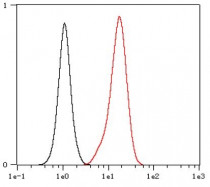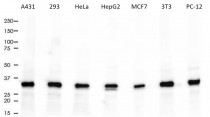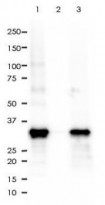ARG66388
anti-PCNA antibody [SQab18115]
anti-PCNA antibody [SQab18115] for Flow cytometry,Immunoprecipitation,Western blot and Human,Mouse,Rat,African green monkey,Bovine,Chicken,Dog

Overview
| Product Description | Recombinant Rabbit Monoclonal antibody [SQab18115] recognizes PCNA |
|---|---|
| Tested Reactivity | Hu, Ms, Rat, AGMK, Bov, Chk, Dog |
| Tested Application | FACS, IP, WB |
| Host | Rabbit |
| Clonality | Monoclonal |
| Clone | SQab18115 |
| Isotype | IgG |
| Target Name | PCNA |
| Antigen Species | Human |
| Immunogen | Synthetic peptide corresponding to aa. 100-200 of Human PCNA. |
| Conjugation | Un-conjugated |
| Alternate Names | PCNA; ATLD2; Cyclin; Proliferating cell nuclear antigen |
Application Instructions
| Application Suggestion |
|
||||||||
|---|---|---|---|---|---|---|---|---|---|
| Application Note | * The dilutions indicate recommended starting dilutions and the optimal dilutions or concentrations should be determined by the scientist. |
Properties
| Form | Liquid |
|---|---|
| Purification | Purification with Protein A. |
| Buffer | PBS, 0.01% Sodium azide, 40% Glycerol and 0.05% BSA. |
| Preservative | 0.01% Sodium azide |
| Stabilizer | 40% Glycerol and 0.05% BSA |
| Storage Instruction | For continuous use, store undiluted antibody at 2-8°C for up to a week. For long-term storage, aliquot and store at -20°C. Storage in frost free freezers is not recommended. Avoid repeated freeze/thaw cycles. Suggest spin the vial prior to opening. The antibody solution should be gently mixed before use. |
| Note | For laboratory research only, not for drug, diagnostic or other use. |
Bioinformation
| Database Links | |
|---|---|
| Gene Symbol | PCNA |
| Gene Full Name | proliferating cell nuclear antigen |
| Background | The protein encoded by this gene is found in the nucleus and is a cofactor of DNA polymerase delta. The encoded protein acts as a homotrimer and helps increase the processivity of leading strand synthesis during DNA replication. In response to DNA damage, this protein is ubiquitinated and is involved in the RAD6-dependent DNA repair pathway. Two transcript variants encoding the same protein have been found for this gene. Pseudogenes of this gene have been described on chromosome 4 and on the X chromosome. [provided by RefSeq, Jul 2008] |
| Function | Auxiliary protein of DNA polymerase delta and is involved in the control of eukaryotic DNA replication by increasing the polymerase's processibility during elongation of the leading strand. Induces a robust stimulatory effect on the 3'-5' exonuclease and 3'-phosphodiesterase, but not apurinic-apyrimidinic (AP) endonuclease, APEX2 activities. Has to be loaded onto DNA in order to be able to stimulate APEX2. Plays a key role in DNA damage response (DDR) by being conveniently positioned at the replication fork to coordinate DNA replication with DNA repair and DNA damage tolerance pathways. Acts as a loading platform to recruit DDR proteins that allow completion of DNA replication after DNA damage and promote postreplication repair: Monoubiquitinated PCNA leads to recruitment of translesion (TLS) polymerases, while 'Lys-63'-linked polyubiquitination of PCNA is involved in error-free pathway and employs recombination mechanisms to synthesize across the lesion. [UniProt] |
| Calculated MW | 29 kDa |
| PTM | Phosphorylated. Phosphorylation at Tyr-211 by EGFR stabilizes chromatin-associated PCNA. Acetylated by CREBBP and p300/EP300; preferentially acetylated by CREBBP on Lys-80, Lys-13 and Lys-14 and on Lys-77 by p300/EP300 upon loading on chromatin in response to UV irradiation (PubMed:24939902, PubMed:19419956). Lysine acetylation disrupts association with chromatin, hence promoting PCNA ubiquitination and proteasomal degradation in response to UV damage in a CREBBP- and EP300-dependent manner (PubMed:24939902). Acetylation disrupts interaction with NUDT15 and promotes degradation (PubMed:19419956). Ubiquitinated (PubMed:24939902, PubMed:20227374). Following DNA damage, can be either monoubiquitinated to stimulate direct bypass of DNA lesions by specialized DNA polymerases or polyubiquitinated to promote recombination-dependent DNA synthesis across DNA lesions by template switching mechanisms. Following induction of replication stress, monoubiquitinated by the UBE2B-RAD18 complex on Lys-164, leading to recruit translesion (TLS) polymerases, which are able to synthesize across DNA lesions in a potentially error-prone manner. An error-free pathway also exists and requires non-canonical polyubiquitination on Lys-164 through 'Lys-63' linkage of ubiquitin moieties by the E2 complex UBE2N-UBE2V2 and the E3 ligases, HLTF, RNF8 and SHPRH. This error-free pathway, also known as template switching, employs recombination mechanisms to synthesize across the lesion, using as a template the undamaged, newly synthesized strand of the sister chromatid. Monoubiquitination at Lys-164 also takes place in undamaged proliferating cells, and is mediated by the DCX(DTL) complex, leading to enhance PCNA-dependent translesion DNA synthesis. Sumoylated during S phase. Methylated on glutamate residues by ARMT1/C6orf211. [UniProt] |
Images (3) Click the Picture to Zoom In
-
ARG66388 anti-PCNA antibody [SQab18115] FACS image
Flow Cytometry: HeLa cells were fixed with 4% paraformaldehyde (10 min) and then permeabilized with 0.1% TritonX-100 for 15 min. The cells were then stained with ARG66388 anti-PCNA antibody [SQab18115] (red) at 1:2000 dilution in 1x PBS/1% BSA for 30 min at room temperature, followed by Alexa Fluor® 488 labelled secondary antibody. Unlabelled sample (black) was used as a control.
-
ARG66388 anti-PCNA antibody [SQab18115] WB image
Western blot: 10 µg of A431, 293, HeLa, HepG2, MCF7, 3T3 and PC-12 cell lysates stained with ARG66388 anti-PCNA antibody [SQab18115] at 1:2000 dilution.
-
ARG66388 anti-PCNA antibody [SQab18115] IP image
Immunoprecipitation: 0.4 mg of HeLa whole cell lysate was immunoprecipitated (1:50 dilution) and stained with ARG66388 anti-PCNA antibody [SQab18115].
Lane 1: Immunoprecipitation in HeLa whole cell lysate
Lane 2: PBS instead of Primary Ab in HeLa whole cell lysate
Lane 3: HeLa whole cell lysate, 10 µg (input)
Customer's Feedback









